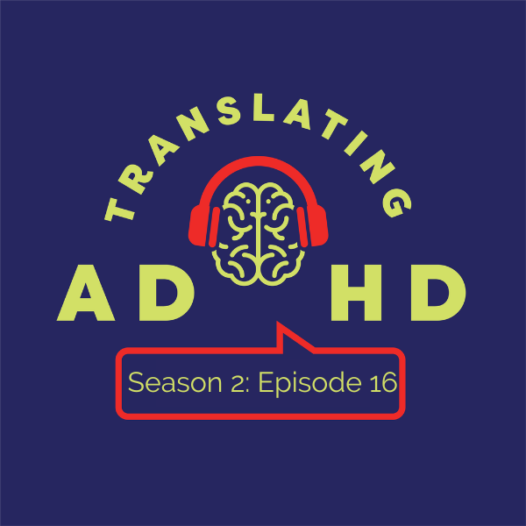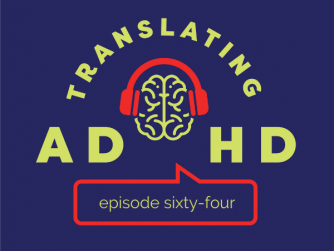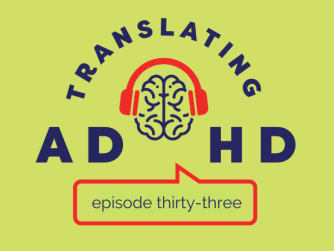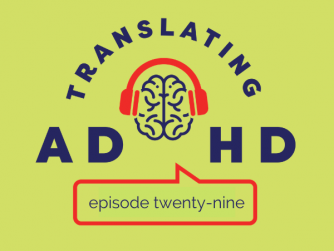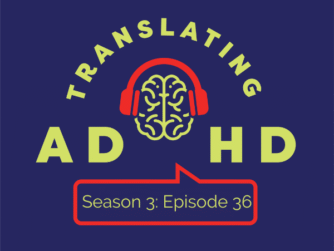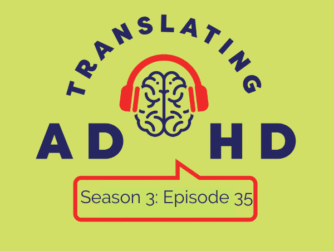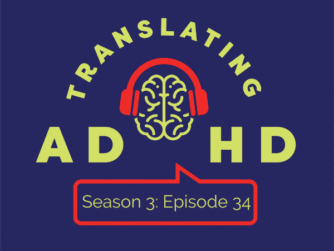Ash and Cam sampled challenges from their Patreon community to provide inspiration and content for today’s episode. They chose to focus on one post about the challenges of modern living, and how to engage and be productive when one is maxed out with all of the demands for one’s attention. The hosts explore the dilemma of managing modern living, unpredictable childcare, and ever changing workplace demands.
They relay how the listener articulates the dilemma of prioritizing, scheduling and identifying a starting place in any task, and how to get a meaningful completion in the face of too many inputs and demands. The episode emphasizes the importance of articulating challenges, finding meaningful completion, and distinguishing between the “here and now” and the “not here, not now” aspects in managing tasks and priorities and how this elicits specific neural network activation.
Episode links + resources:
For more of the Translating ADHD podcast:
- Episode Transcripts: visit TranslatingADHD.com and click on the episode
- Follow us on Twitter: @TranslatingADHD
- Visit the Website: TranslatingADHD.com
Episode Transcript:
[00:00:00] Ash: Hi, I’m Ash [00:00:08] Cam: And I’m Cam. [00:00:08] Ash: And this is Translating ADHD. Cam, do you want to tell our listeners what it is we’re going to be talking about today? [00:00:15] Cam: Sure, Ash. So we’re going to be moving back in the direction of considering individuals with ADHD and their lived experience. And back to these topics that you’re interested in around avoidance and procrastination and challenges just in the workday or trying to live through your day. And we’re also going to be looking at what I’m calling right now, not-so-dynamic duos in the sense of ADHD with comorbid conditions.So if you have ADHD or a diagnosis of ADHD, you’re very likely to have some other condition such as anxiety or depression. And so we’re gonna be getting into that again. We’re not practitioners. We are coaches. But we work with clients who are grappling with dual diagnoses or more than two diagnoses. What they are doing to manage how ADHD can exacerbate conditions like depression or anxiety. And so we’re going to move in that direction a little bit.
Before we do that, I put something out to our Discord community, I just invited folks to have some input into what they’d like to see us discuss on the podcast. And so we got a pretty good contribution or input. And there’s one in particular, Ash, I’d like to read to the group because I think it exemplifies modern living.
Now, often people look at ADHD as this thing that it’s like you treat it and it’s this isolated thing, when in fact weaves and integrates and influences in all different aspects, especially when more than one person in the family has ADHD. And if you’ve got multiple generations with ADHD, it can compound a situation. So I’m going to read this from one of our Discord patrons. And so then we’ll talk about the coaching that we can do in this situation.
[00:02:10] Ash: Cam, before you do that, I just want to let our listeners know that you didn’t age 20 years overnight. You’re just a little under the weather in terms of how gravelly you sound. You got that husky old man voice. [00:02:24] Cam: I was just recovering from a week under the weather. Yeah, I do sound like, I don’t know, yeah, I was gonna say Joe Biden, but I don’t wanna offend anyone out there. [00:02:36] Ash: You do sound a little like Joe Biden. [00:02:39] Cam: People, I have this economic situation in good hands. And so yeah… [00:02:47] Ash: This has been Impressions by Cam. [00:02:49] Cam: I’ve not, yeah, I’m not aged. So here’s from one of our individuals, and I’ll start: “Not sure how generalizable these are, and I apologize if it is too specific, but three things I’m struggling with right now are – I can’t start this because I’ll just get interrupted before I get to a completion point; I can’t think about how to prioritize because then I need to unwrap everything I need to do, and I’ll get crushed; and the last one is, I can’t schedule this because my actual schedule will get disrupted, bumped, and I’ll have to do it all over again.”And he goes on to share some more here, and I think it’s worthwhile bringing it in because, Ash, what’s nice here is one of our listeners articulating the dilemma and this is so key, right? This understand, own, translation. They’re doing some translation here or some understanding of the dilemma.
That is one of the biggest challenges with ADHD what is going on. I know this person is listening. I just want to tip my – Joe Biden wants to tip his hat – to you just to give a shout-out to the language here of the level of awareness. Where Ash and I are always talking about how important awareness is and that ADHD can be so hard to pin down. What is the ADHD dilemma here?
I’ll continue here: “The context feeding into these, for me, is needing to take care of small kids who get up at the same time and need to go to bed at the same time, so I can’t squeeze in extra hours by staying up late, or I’ll run myself into the ground and be a jerk. They get sick unpredictably, meaning I have to completely rearrange my work schedule to stay home with them for however long. And who immediately becomes,” I love this part, “who immediately becomes interested in me if I’m paying attention to something important that isn’t to them, texting a friend, or writing a work email. They’ll otherwise ignore me if I’m just mindlessly surfing on my phone. Added to that is a workplace where we’re drastically expanding our scope and expectations without a real increase in head count. And where priorities are now often changing week to week with little warning.”
“Finally,” I’ll just finish up with this part, “is I have avoidantly coped with this by either going to what’s most obviously on fire, or at least something obviously on fire, or just hunkering down and mindlessly scrolling. And I’m going to avoid him because I’m afraid if I engage, it’ll just become another task in progress rather than something I can, even to a small achievable degree, complete on and then get added to my mental ball of dread.”
So just great language. And I think it’s a great prompt for us to talk about the challenges of modern living and that our unpredictable childcare and unpredictable things at work are adding up. And it’s just, how can I start something? Get a completion. This person sounds like they’re at their limits.
[00:05:59] Ash: Cam, this very much sounds like something a client could come and kick off a session with. Verbalizing exactly this type of dilemma. And the language I like to use for this place is the undifferentiated mass. We used that on the podcast ages ago. We haven’t talked about it in a while, but that’s at the heart of this dilemma, is this undifferentiated mass of stuff, of tasks that this client has consciously or unconsciously assigned to themselves with no way of making sense of it beyond that. What do I prioritize? Where can I complete it? What does a smaller completion look like? It’s all just this ball of ugh.And I love that you bring in modern living. That’s a huge challenge for my clients, particularly in the post-lockdown era where rules are constantly changing. The rules around when kids can or can’t go to daycare under what symptoms. The schools and daycares have to close unexpectedly or go virtual due to too many staff outages due to sickness. Workplaces, some are going from work at home back to the office, or work at home to a hybrid model, which is almost the worst of both worlds for a lot of my clients because it just introduces extra schedule disruption.
And so it’s important to recognize that these are dilemmas that everyone is facing right now. Everything is just a little bit harder than it was before. Heck, my grocery store sometimes is still short on certain items, so I can’t reliably go to the grocery store and do my routine and know that I can pick up all of my basics in one stop. That adds a lot of executive function tax. All of the things I named do.
[00:07:58] Cam: I had a word for kids. What was it? I think uncompliant. I just called them on compliance in the sense of their, or noncompliance, maybe it’s noncompliance. They don’t care. They’re not going to honor your cubicle space, your magic zone of space, of productivity.And I love what he said about though when it’s important. They’re all of a sudden, it’s what are you doing? What are you doing? Yes, I know I’m now older than the age of Joe Biden, but I do remember having children. I have one upstairs with a snow day. She’s 15. She’s good to go, right?
Again, she’s got her agenda. But when she was 4, she was looking for a program. And if I’m the parent at home, I’ve got to make adjustments there. So just bringing in children into the situation, as you said, with disruptions in our school schedules and they are, you can set up the best program possible, but, it’s like, they’re not going to necessarily understand what a healthy boundary is.
And so I think in this situation, it feels like to me the Discord member is feeling in a, between a rock and a hard place. And there’s no room to, again, back to those I can’t statements again – I can’t start. I can’t think. I can’t schedule. And there’s no room to maneuver.
Ash, I did my weekly tweet, one of my weekly tweets was this week.
[00:09:35] Ash: What was it, Cam? [00:09:36] Cam: It was all about limits. And that neurotypicals see limits are these things that you test and you learn from and you get to your limit and it’s a growth opportunity. And what I said was that for people with ADHD, our limits are like unwelcome house guests who have stayed well past their limit. We’re always at our limits. Often. And it is this interesting dilemma where, again, in modern living, it’s, there’s too much to do. It’s always changing.That’s the other thing that’s happening is these added demands and surprises at work. But the other thing that happens with us at limits is it’s close to these limits where we find activation. Someone was talking about flying too close to the sun mythology of Icarus, right? Of flying too close to the sun. And again, losing wings. We have a belief that we can only be productive when we fly close to the sun, right? We need that big signal. We need that interest. We need that excitement or that sort of a little bit of a tight fit or a box to create some structure for us.
And I don’t know if this is the situation for this particular individual who wrote this down. But that’s another thing to pay attention to. We can be so much between a rock and a hard place, we use that rock in a hard place to activate, to make things happen. Because when we have not enough, if we have too much space, not a lot going on and we’re like, I got plenty of time, right? There’s no urgency. There are no useful structures around here.
The other thing that brings to my attention is this: I remember we did a couple of episodes on the planners and the doers and how planners will plan and plan and doers will do. The dilemma is being able to move back and forth between planning and planning, reflecting, thinking, breaking into the doing piece.
And again, here is this Discord member who is articulating so well this desire for a meaningful completion. I love those words. That’s what I’m all about is finding that meaningful completion, but ADHD can make it so hard to break out of the planning, scheduling, and thinking into the doing, and back again without that disruption or interruption.
[00:12:07] Ash: And oftentimes, when we’re in this overwhelmed state, the types of planning we might be doing aren’t really useful, right? We’re going at it from the, what tool can organize this in a way that makes sense to me? Or how can I make a system rigid enough or with enough rules or with enough incentives to create some sort of forcing mechanism for momentum?When, interestingly enough, when a client of mine comes to me with a topic like this one, this rock and hard place, everything’s overwhelming, and there’s no time for anything. More than anything else, just getting them talking about and articulating what’s on their plates, and starting to differentiate that undifferentiated mass will usually help create some clarity.
I had a session like this recently with a client who works for a nonprofit, a very bootstrapped one, doing very deep research. Difficult political work in a state that’s not supportive of that work, which makes it more important that this work is happening. And she’s about to go on leave for surgery and came to the session just, there’s so much to do. There’s so much to do, and I don’t know how to do it, and I don’t know what to do.
And so we started talking about it a little bit and she said, I got to do this whole social media plan. And before I could even say anything, came just by her articulating it out loud, she went well, wait a minute. Instead of thinking about it as a whole social media plan – this whole big thing – it doesn’t have to be. And this is her language. It doesn’t have to be a big ass thing. What do I need to do? I know it doesn’t have to be a big ass thing. It’s great. That’s become one of one of my mantras.
[00:14:03] Ash: Actually, I loved it so much. It doesn’t have to be a big ass thing. What needs to happen. As she’s articulating, she’s shifting out of her overwhelmed, fearful, and anxious brain into curiosity. Wait a minute, okay what needs to happen before I leave? Okay. And it was like two things. It was like email and social media calendars for the next two months. Just for January and February. And it doesn’t have to be a big ass thing. It just needs to be enough of a thing to tell whoever is taking over for her while she is out what they need to do.And so just spending some time articulating it, getting it out of her head, helped her break that down. And I have a couple of clients for whom we identified that as a method of support. When you’re overwhelmed, when you don’t know what to do next, who is a supportive person that you can grab in the workplace to maybe talk about that, to just, I call this talking at, right?
And Cam, you know this well, because I do it to you sometimes in DMs, right? I’ll say I’m talking at you more than to you, so read what you will, but I don’t necessarily need a response from you. And when I say talking at, what I mean is I’m talking to someone who gets the context of whatever it is I’m trying to pick apart and may or may not have something to offer. But just because you get what I’m talking about, and I’m talking to you rather than to myself, can help create some clarity where clarity is missing.
[00:15:39] Cam: And with that clarity, there’s objectivity, right? If you are talking to me, you’re getting some distance from the dilemma. You’re sharing the dilemma. And again, it’s there’s certain people you want to do this with and certain people you do not want to do this with.The other thing I’ll just add to that is I was thinking about a client who has that big idea generator. She’s a creative. And when someone asks, Hey, can you get me, give me your input on the Johnson project, she takes that and it’s like input, they want my input. What does that mean? And it’s so hard to define what the actual ask is, and so we will go into our big idea generator and start to be thinking about this.
And I love what you said earlier about this sort of fueled by the urgency and anxiety of the moment. I don’t have time for this. They want my input on the Johnson project, and then they start, oh, I got to do a slide deck. And it turns out it was like, she finally reached out to the person and was like, can you clarify the ask for me? Is that taking the party, taking the dialogue, outside of your head and asking others for clarification of that priority,
[00:16:56] Ash: Another thing I like to do, especially with newer clients that I don’t know as well yet when they’re coming up with a topic like this, this is one of the rare times that I will propose without attachment to it, but where I will propose an action to my clients. And that is doing a brain dump of spending 20 minutes in a quiet room with a notebook or word processor. It doesn’t matter. And just writing it down. Everything that comes to mind. Everything. If it’s up here, put it down on a piece of paper. So you might end up with stuff like “take out the garbage” next to “go to Tahiti” as a lifelong goal. Or whatever. Learn guitar. Learn a language.What I find that this helps do is two things. Number one, seeing everything in black and white makes it a lot easier to see what are my actual commitments right here and now. What do I have to do? What am I committed to doing? What is the consequence if I don’t, if I don’t take out my trash, my trashcans are going to overflow. And that’s a frustrating problem to have. But if I don’t start learning how to play guitar this week, there aren’t necessarily consequences there.
Number two, it can help clarify what the challenge might be from there. So you’ve got this list of whatever. And the idea from there is, okay, what are the commitments? Let’s pull those off of that list onto a master list of tasks. And that question often helps me understand as a coach where my client might be struggling.
For some clients, that’s what they needed, right? We did the brain dump. We’ve had this clarity when we distinguish between what’s a commitment for now. What’s for later? What’s maybe just a big idea generator that needs to be for another time or maybe not at all? Doers, right, who struggles to pare down the list? I have one client who is just so immensely interested and fascinated by literally everything, that one of his big overwhelming dilemmas.
And something cool that’s happening in our coaching. Now, some shifting around that is he just wants to be able to do it. He genuinely wants to be able to do it all. If he had infinite time and energy, he would be the guy who would eventually tackle everything on that list in some way, shape, or form. And so it’s really hard to let go of some things.
And for him, and he has small children as well, two of them, a big learning has been the reality of time, like really coming to awareness. Not just on the best days, on the days where everything goes exactly as it’s supposed to, and he’s feeling motivated and a lot happens, but on all the days. Having a better overall sense of how much time there is in a day, in a week, in a month. And how much he can realistically commit to and move forward at any given time. And this has been over a year or so of coaching through this because this is a client who struggled to, and is still to some degree struggling with, letting go of all that he could do.
[00:20:19] Cam: I want to come back to some great examples there. I’m going to come back to that second line of what the client said: “I can’t think about how to prioritize because then I need to unwrap everything I need to do, and I’ll get crushed.” And I think that this speaks to this as this sort of seeing that undifferentiated mass and just have to open it all or open the whole calendar and have to redo the whole thing. We think and consider time tasks and absolutes. It’s very difficult to make these distinctions.It’s got me thinking about a book that I’ve been reading – listening to – it’s called The Molecule of More. Lieberman, I believe, is the author. And so it’s about dopamine, right? Dopamine is the molecule of more. And there was something in there that got my attention of another way to distinguish the undifferentiated mass. And what you were saying had me think about this.
Now we talk about time blindness. We talk about now, not now. Now time and not now time. As I was listening to the the book, it had me consider something else other than now and not now. And it’s here and not here, right? It’s when we think about there’s the time, our present moment, and then our not the present moment. And it’s like this, again, very binary either-or for us.
There’s a real struggle between this sort of pursuit mode and possession mode. This is from the book. And the possession mode is everything that’s within three feet of us. And if we’re working on something and we’re in possession, we’re appreciating, we’re eating, we’re being present, dopamine is not activated. What’s activated are the here-and-now neurotransmitters—transmitters like serotonin and endorphins. Oxytocin is a feel-good neurotransmitter.
And so this is part of the ADD dilemma, is being able to manage these two neurotransmitter systems. We are constantly thinking about things that are beyond our current sphere of influence – what’s not here, what’s not now – and being able to delineate that is very difficult.
And so back to what you were saying about – not that this is an episode necessarily just on prioritization – it’s oh, this is about prioritization. It’s a lot of, we’ve touched on a lot of different things, but starting to delineate, distinguish between this, the thing that I have in my possession right now. What can I do with my time right now? What do I have here that isn’t the here and the now? And am I getting drawn into this area of the not here, not now, right? It’s oh, I don’t have this, I need this. Starting to delineate that and think about what’s the thing I can work on right now that I have in my possession, that you don’t have to pursue something to go for that completion because that completion does release more here and now neurotransmitters.
[00:23:06] Ash: Cam, I love that. And what I’ll add to it is look for the here and now. Also, look for the should. Maybe there is something you can do in the here and now, but there’s a should hanging over you that says no, this thing is more important, more urgent, more this, more that. You should do that.This is the whole eat the frog first mentality. And actually, I talked to a client about that this week as well. She said eating the frog had never once worked for me, never once yet. I will still, it was the same client, now that I think about it, I will still, same coaching session. I will still come in the morning and tell myself that I have to eat the frog. Which just leads to avoidance and delay in everything.
Another thing, and this is why I like the brain dump for my clients, is we will assign tasks to ourselves without even realizing it. Our brains are so fast. And I notice myself doing that more and more around my house, coming to awareness again, adjusting from being a two-person household back to a one, getting my house back the way I want it.
And in any given room, I’ll notice, oh my gosh, the windows need to be cleaned. It’s four degrees outside, Cam. I’m not going to clean the windows. But by adding that mentally to my task list, do you see how completion in a room may not be achievable if the windows have to be cleaned? So how can I redefine completion here? Or how can I incrementally work towards completion?
In my office, I want to move the furniture around, which my desk is huge. It’s going to be a multi-person job. It’s going to be a whole thing. I’m going to have to unhook all of my electronics. It’s going to be a whole thing. And that became a delay for otherwise keeping my office the way that I like it. It’s two things can be true. I can have a nice space to work in now, and I can separately work towards this goal of changing the space around.
[00:25:04] Cam: I think that’s a good place to finish up, Ash, today. It was just interesting to get all the engagement on our Discord inputs from folks about things that they’d like to hear. And just lots of interesting topics here in our episode today. [00:25:19] Ash: I agree, Cam. Let’s wrap it up here. So until next week, I’m Ash. [00:25:22] Cam: And I’m Cam. [00:25:23] Ash: And this was the Translating ADHD Podcast. Thanks for listening.
